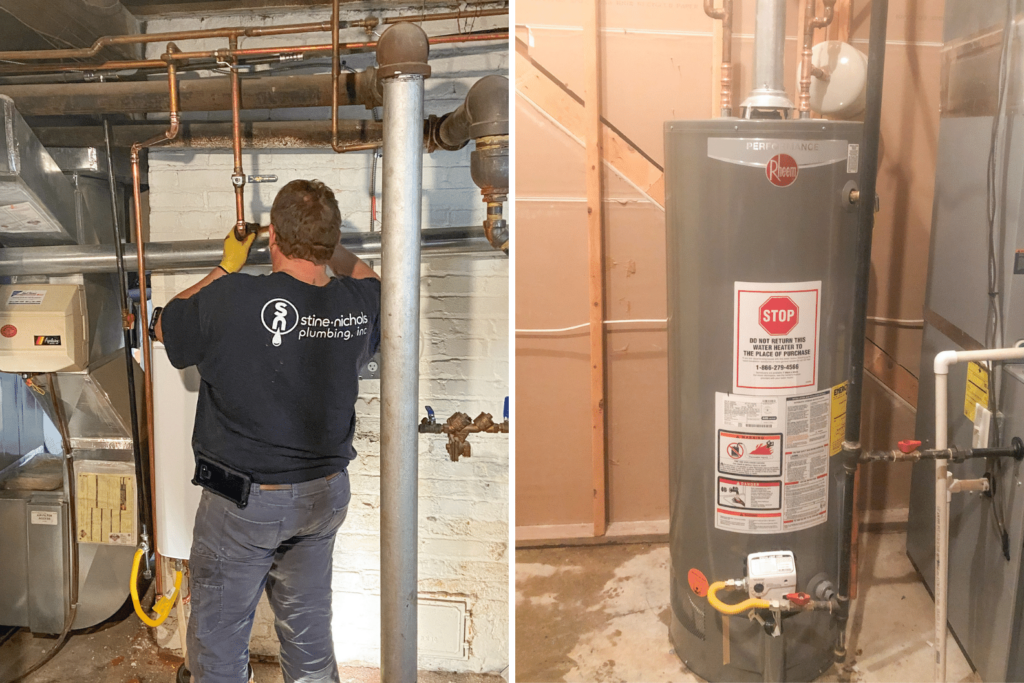When it comes to household plumbing, it’s easy to ignore some of the various components until something goes wrong. Unfortunately, acting in a reactive manner is typically not the smartest of moves in regards to plumbing maintenance. The longer you let even a minor issue go, the worse it can get. Here at Stine-Nichols Plumbing, one of our most popular installations each year is hot water heaters. They’re certainly essential to our day-to-day lives and one of those plumbing components we always want working!
With so many reliable water heater brands currently on the market, there’s no reason to choose a lackluster brand. If you want a complete rundown on a few of the brands we recommend here at Stine-Nichols, be sure to check out our recent blog here. It dives into the topic to ensure you get a reliable product installed. However, on this week’s blog, we’re going to be analyzing water heaters from a maintenance standpoint. In particular, we’ll be discussing routine tips that will help ensure you get the maximum years out of your water heater.
Know How Long Your Water Heater Should Last
Before we get into the actual tips for getting the maximum years out of your water heater, it’s important to have a general understanding of how long most water heaters last. This will ensure you know what to expect and have an idea of when a replacement may be on the horizon. Keep in mind that these estimates assume you’re properly maintaining the unit as well!
With most gas water heaters, you’re looking at an average of 10-12 years. Meanwhile, most national averages have electric water heaters lasting a couple of years longer than that. On the flip side, if you opt to go with a tankless heater, you’ll be looking at 20+ years. Of course, tankless units are going to come with a higher upfront cost, but will nonetheless last much longer than a traditional tank-style unit.
Now that we’ve discussed some general estimates for water heater lifespans, let’s look at some best practices to ensure you not only reach those expectations, but possibly exceed them.
Tip #1: Flushing the Tank
First and foremost, an easy annual maintenance task we always recommend to our customers is to flush your water heater. This is something we recommend doing once a year. The reason why this is so important is fairly straightforward. As your water heater works on a daily basis, there is gradually going to be minerals and sediment that will build up at the bottom of your tank. Considering you have a heating element towards the bottom of your tank as well, it is going to have to work harder to heat the water when this happens. It’s as simple as that! The longer it is under this increased pressure, the more wear and tear it will cause on the unit itself.
We outlined the complete process of flushing your water heater in a prior blog post linked HERE. It is also a routine maintenance item we offer to our customers in the Kansas City area. If you’re interested in having one of our service technicians out to do so, don’t hesitate to give us a call at (816) 348-3481.
Tip #2: Importance of Space
While routine maintenance throughout the water heater’s lifespan is important, it should come as no surprise that the original installation methods are just as critical. Our second tip today is to make sure to give the water heater some space and room to breath. While this isn’t always possible with some layouts, it’s important to avoid having the water heater feel crowded. Doing so will significantly reduce the risk of fires and also give you plenty of room to perform any routine maintenance.
Tip #3: Be Aware of Hard Water
As we’ve mentioned a few times here on the blog, hard water is an issue that impacts the entire Kansas City area. While hard water is safe to drink and wash with, there are some known side effects to it, which we’ve highlighted before. Hence, why water softeners have become so popular in recent years. Essentially, hard water can be described as water that contains above-average levels of dissolved minerals, particularly calcium and magnesium.
Well, as you might guess, hard water impacts your water heater as well. As we mentioned with the first tip, flushing out your water heater is a task we recommend completing once a year. This will ensure it’s always properly maintained. Considering hard water can result in more frequent limescale formation, you may have to flush it more frequently. Again, this is fully dependent on the location in which you live, but is nonetheless something worth keeping in mind.
Interested in having a water softener installed at your home or business? It’s certainly become one of our most popular services over the past year and something we feel strongly recommending. Stine-Nichols Plumbing currently offers both a salt-based system, as well as the citrus-based NuvoH2O. Click here to learn more about the challenges with hard water!
Tip #4: Considering Regular Check-Up’s
Remember what I mentioned at the start of this blog? It’s always important to act in a proactive manner, rather than a reactive one, when it comes to plumbing. What could’ve easily been resolved with a one-hour service call can gradually transform into a serious plumbing emergency. Trust us, we’ve seen it happen!
Having said that, it’s safe to say a regular maintenance check can certainly be worth the investment. In terms of the water heater, this will be the perfect time to have a plumbing technician look over the heater itself to make sure there’s no cracks, leaks or anything else that could spell future trouble. Additionally, they’ll be able to observe the lines supplying the heater to ensure everything there is all good as well!
Tip #5: Know the Signs of a Replacement
While our final tip may signal a replacement is needed, it is very important to understand what the warning signs are of a failing water heater. This will guarantee you know when it’s time to call a plumber and get a replacement scheduled. Here’s a few of the most common signs we hear from customers prior to getting a replacement installed:
- Rusty Water – Keep in mind this could be due to either rust on the pipes or rust on the tank itself. It would probably be wise to know which is causing the issue prior to investing in a replacement.
- Noises – Anytime your water heater is making loud noises or rumbling sounds, chances are this is a direct result of sediment build-up. A perfect reminder to avoid forgetting to flush your heater!
- Sitting Water – If you notice any water sitting around the heater, this could be an instant sign that something is wrong. It could be something as simple as a minor component failure or something as serious as a leak in the tank. Either way, it would be smart to have a professional get eyes on the situation.
Prefer to Have a Plumbing Pro Look it Over?
For a lot of homeowners, it might make more sense to just have a plumbing professional out once a year to give everything an inspection. They can flush the unit while they’re out there and make sure everything is in working order. It will give you the peace of mind that there’s nothing to worry about and also provide you with the opportunity to pick the plumber’s brain about any plumbing-related questions.
Are you concerned about your water heater? Maybe you have a gas-powered traditional tank-style heater and it’s nearing 12-15 years old, which has you worried it may be nearing its end? No matter what your water heater project may entail, our licensed technicians at Stine-Nichols Plumbing have the experience necessary to handle any water heater repair or replacement. Whether that be repairing an existing unit, replacing it with a new one, or just a general inspection, we’ll provide you with recommendations to ensure you get the best return on your investment. Click HERE to request a free quote from our service department.


